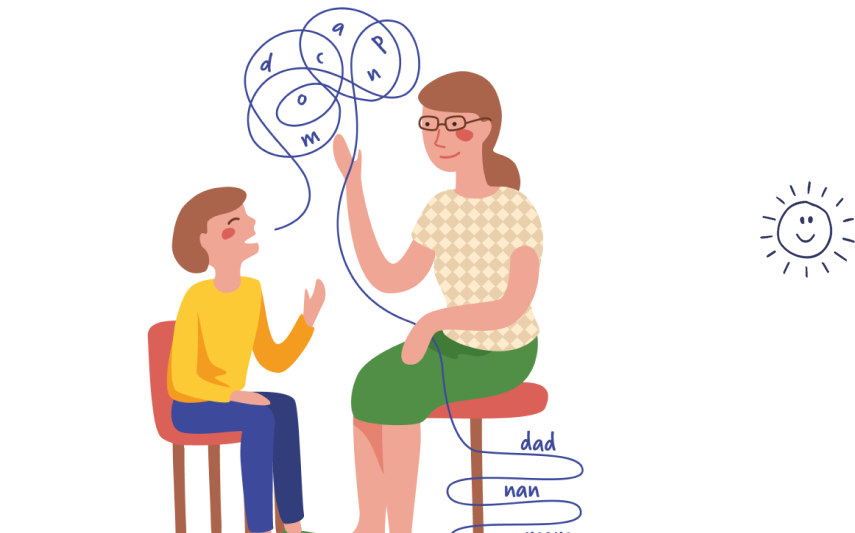

Speech Therapy
Our fully qualified Speech and Language Therapists are licensed by Dubai Health Authority and have expertise in the areas of communication and swallowing disorders. Speech and Language Therapists are qualified healthcare professionals who are able to utilise their expertise and knowledge of evidence based practice to screen, assess, diagnose and treat communication and feeding/swallowing disorders. Our speech and language therapists work with children and adolescents and strive to provide holistic and child centred care as well as support to the child’s caregivers.
What happens first?
We offer a free initial screening of 30-45 minutes to discuss your concerns and screen your child’s communication and/or feeding skills in order to determine whether a full evaluation is needed. We will then recommend and help to guide you through the next steps.
In a speech and language therapy session, a qualified speech-language therapist will evaluate your child's communication skills, identify areas of concern, and develop an individualized treatment plan. Therapy sessions incorporate evidence based practices and will involve engaging activities, games, exercises, and techniques tailored to your child's specific needs which incorporates their goals.
Speech and language therapy can be beneficial for children who experience a range of difficulties, including:
1. Articulation and Pronunciation: If your child has difficulty producing certain speech sounds or struggles with clear pronunciation, a speech and language therapist can work with them to improve their articulation skills and the clarity of their speech.
2. Expressive Language: Speech and language therapy can help children who have difficulties expressing themselves clearly and effectively. This includes being able to functionally communicate their needs, wants, thoughts and feelings; expanding their vocabulary use; using appropriate grammar and sentence structure; and improving overall language skills.
3. Receptive Language: Some children have difficulty understanding and processing language. Speech and language therapy can assist in enhancing their ability to comprehend and follow instructions, understand concepts, expand their vocabulary knowledge and improve their overall comprehension skills.
4. Phonological Awareness and Early Literacy: Speech and language therapists are able to help foster improved early literacy which encompasses developing rich vocabulary, selfexpression, and reading comprehension—tools they need to become successful readers and lifelong learners. Speech and language therapists also assist with phonological awareness
which are the underlying skills needed for effective reading and writing skills - such as rhyming, identifying phonemes, synthesising and blending skills.
5. Fluency Disorders: Speech and language therapists work with children who have difficulties with speech fluency by utilising speech fluency techniques to reduce disfluencies and increase the child’s control of their speech. Fluency difficulties include normal disfluencies as well as stuttering and cluttering which can significantly impact a child's communication.
6. Voice Disorders: If your child has a voice disorder characterized by abnormalities in pitch, volume, or quality of their voice, speech therapy can help them develop healthy vocal habits and improve vocal production.
7. Social Communication: Speech and language therapy can assist children with social communication difficulties, such as challenges with conversational skills, understanding non-verbal cues, maintaining eye contact, and interpreting language in social contexts.
8. Feeding and Swallowing Disorders: Speech and language therapists with expertise in this area can address difficulties related to chewing, swallowing, and feeding, ensuring your infant/child develops appropriate oral sensory motor skills and feeding skills.
Speech and language therapy can help your child in several ways:
1. Assessment and Diagnosis: A speech and language therapist will evaluate your child's communication skills to identify any areas of concern and determine the nature and severity of their difficulty as well as identify strengths which can be built upon.
2. Individualized Treatment: Based on the assessment, the therapist will develop a personalized treatment plan tailored to your child's specific needs. Therapy sessions may include various techniques and exercises -which are evidence based - to target the areas of difficulty.
3. Improvement of Communication Skills: Through regular therapy sessions, your child can work on improving their speech sounds, language skills, fluency, voice quality, or feeding and swallowing abilities. Therapy may involve practicing sounds, learning new vocabulary, improving grammar and sentence structure, utilising fluency techniques, working on narrative skills, incorporating alternative and augmentative communication (AAC) where necessary, working on social communication skills, and targeting safe feeding and swallowing skills amongst other areas.
4. Enhancing Confidence and Self-esteem: Speech and language therapy can help boost your child's confidence in their communication abilities.
5. Supporting the use of AAC (if required): Our therapists are trained in the use of sign language, Picture Exchange Communication (PECs) and Proloquo2go as well as many other alternative communication systems. If your child would benefit from the use of an AAC device, to supplement or enhance their communication abilities, this would be discussed with you. An assessment would then be carried out, to find the method of communication most suitable for your child and your family to use.
It is important to note that each child's therapy journey is unique, and the duration and frequency of therapy will depend on the severity of their communication challenges. Regular practice and support from parents and caregivers outside of therapy sessions can also contribute to the child's progress.




